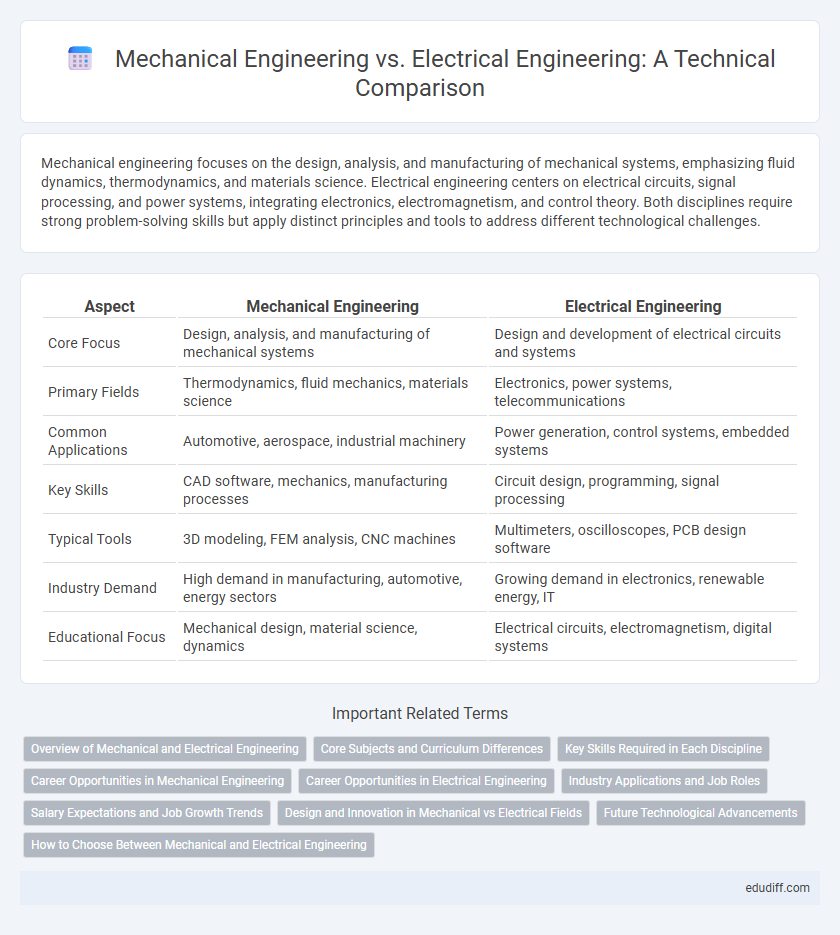Mechanical engineering focuses on the design, analysis, and manufacturing of mechanical systems, emphasizing fluid dynamics, thermodynamics, and materials science. Electrical engineering centers on electrical circuits, signal processing, and power systems, integrating electronics, electromagnetism, and control theory. Both disciplines require strong problem-solving skills but apply distinct principles and tools to address different technological challenges.
Table of Comparison
| Aspect | Mechanical Engineering | Electrical Engineering |
|---|---|---|
| Core Focus | Design, analysis, and manufacturing of mechanical systems | Design and development of electrical circuits and systems |
| Primary Fields | Thermodynamics, fluid mechanics, materials science | Electronics, power systems, telecommunications |
| Common Applications | Automotive, aerospace, industrial machinery | Power generation, control systems, embedded systems |
| Key Skills | CAD software, mechanics, manufacturing processes | Circuit design, programming, signal processing |
| Typical Tools | 3D modeling, FEM analysis, CNC machines | Multimeters, oscilloscopes, PCB design software |
| Industry Demand | High demand in manufacturing, automotive, energy sectors | Growing demand in electronics, renewable energy, IT |
| Educational Focus | Mechanical design, material science, dynamics | Electrical circuits, electromagnetism, digital systems |
Overview of Mechanical and Electrical Engineering
Mechanical engineering centers on the design, analysis, and manufacturing of mechanical systems, emphasizing thermodynamics, fluid mechanics, and robotics. Electrical engineering focuses on electrical circuits, control systems, and electromagnetics, driving innovations in power generation, electronics, and communication technologies. Both disciplines intersect in automation and mechatronics, integrating mechanical components with electrical control systems.
Core Subjects and Curriculum Differences
Mechanical Engineering emphasizes core subjects such as thermodynamics, fluid mechanics, and materials science, focusing on the design, analysis, and manufacturing of mechanical systems. Electrical Engineering centers around circuit theory, electromagnetics, and control systems, dealing primarily with electrical devices, signal processing, and power distribution. The curriculum divergence reflects these priorities, with Mechanical Engineering incorporating more hands-on work in mechanics and materials, while Electrical Engineering focuses on electronics, programming, and system integration.
Key Skills Required in Each Discipline
Mechanical engineering requires strong skills in thermodynamics, fluid mechanics, materials science, and mechanical design, emphasizing proficiency in CAD software and hands-on knowledge of manufacturing processes. Electrical engineering demands expertise in circuit analysis, electromagnetism, control systems, and signal processing, alongside programming skills and familiarity with hardware development tools like oscilloscopes and microcontrollers. Both disciplines value problem-solving abilities, analytical thinking, and proficiency in simulation software to design, test, and optimize complex systems.
Career Opportunities in Mechanical Engineering
Mechanical engineering offers diverse career opportunities in industries such as automotive, aerospace, manufacturing, and energy, where professionals design, analyze, and maintain mechanical systems. Expertise in CAD software, thermodynamics, and materials science enhances employability in roles like design engineer, project manager, and quality control engineer. Continuous innovation in robotics, renewable energy, and automation drives high demand for skilled mechanical engineers.
Career Opportunities in Electrical Engineering
Electrical engineering offers diverse career opportunities in sectors like telecommunications, renewable energy, and automation, driven by advancements in smart grid technology and IoT systems. Professionals can specialize in areas such as circuit design, embedded systems, or power distribution, with strong demand in industries focused on electric vehicle development and robotics. The field's rapid innovation pace ensures continual growth and high earning potential compared to traditional mechanical engineering roles.
Industry Applications and Job Roles
Mechanical engineering primarily focuses on designing, analyzing, and manufacturing mechanical systems used in industries such as automotive, aerospace, and manufacturing automation. Electrical engineering involves working with electrical systems, circuitry, and power generation, finding applications in telecommunications, electronics, and energy sectors. Job roles in mechanical engineering often include design engineer, maintenance engineer, and manufacturing engineer, while electrical engineering careers typically feature roles like power systems engineer, electronics engineer, and control systems engineer.
Salary Expectations and Job Growth Trends
Mechanical engineering salaries average around $88,000 annually, with job growth projected at 4% over the next decade due to steady demand in manufacturing and aerospace industries. Electrical engineering offers a higher average salary near $101,000 per year, driven by expanding opportunities in renewable energy, automation, and telecommunications, with a growth rate estimated at 7%. Both fields benefit from robust employment prospects, but electrical engineering tends to have faster growth and higher salary potential linked to technological advancements.
Design and Innovation in Mechanical vs Electrical Fields
Mechanical engineering emphasizes the design and innovation of physical systems such as engines, HVAC, and robotics, leveraging principles of mechanics, thermodynamics, and materials science to optimize mechanical performance and durability. Electrical engineering focuses on designing and innovating electrical circuits, control systems, and communication devices, applying concepts of electromagnetism, signal processing, and embedded systems to enhance functionality and efficiency. Both fields drive technological advancement through specialized design methodologies that address unique challenges in mechanical structures and electrical components.
Future Technological Advancements
Mechanical engineering will increasingly incorporate advanced materials and additive manufacturing, enabling the creation of lighter, stronger components for aerospace and automotive industries. Electrical engineering is poised to drive the expansion of renewable energy systems, smart grids, and the proliferation of Internet of Things (IoT) technologies with enhanced sensor networks and energy-efficient electronics. Both disciplines will converge in areas like robotics and automation, leveraging advancements in artificial intelligence, embedded systems, and cyber-physical integration to revolutionize manufacturing and infrastructure.
How to Choose Between Mechanical and Electrical Engineering
Choosing between Mechanical Engineering and Electrical Engineering depends on your interest in physical systems versus electrical systems and circuitry. Mechanical Engineering emphasizes design, analysis, and manufacturing of mechanical devices, often requiring strong skills in thermodynamics, fluid mechanics, and materials science. Electrical Engineering focuses on electrical circuits, signal processing, and power systems, demanding expertise in electromagnetism, control systems, and electronic components.
Mechanical Engineering vs Electrical Engineering Infographic

 edudiff.com
edudiff.com